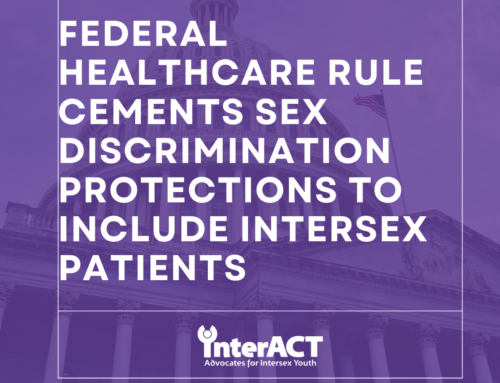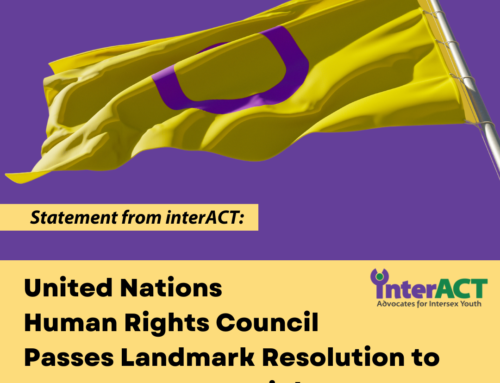Dear Colleague: intersex voices matter, and it’s about time you listen.
In 2011, the Office for Civil Rights (OCR) released a Dear Colleague Letter that presented guidelines on legal obligations in addressing sexual violence in school and on campuses across our country. While this written request is not exactly the same, our objective is parallel. Educational institutions have a goal—and responsibility—to protect youth from harm; so do medical associations such as the American Urological Association and the Societies for Pediatric Urology. Sometimes, though, even those with students’ (or in this case, patients’) best interests at heart need a bit of guidance in order to fully realize their mission of helping youth lead healthy and happy lives.
Just as no parent wants to send their child off to college with the chance that they might be harmed by sexual assault, no parent wants their kid to grow up harmed by stigma or shame. However, just as many universities have systematically failed to adequately address this issue of assault, we believe certain medical associations are also falling short on serving intersex patients and their families.
The discussion of children’s rights to bodily integrity has grown by leaps and bounds in recent decades. Following the highly visible and disturbing Jerry Sandusky trial at Penn State University in 2012, parents have sought ways to reduce their children’s vulnerability to victimization. They’ve been encouraged to do so by promoting a sense of bodily integrity early in child development, including methods such as giving their children the language to clearly communicate boundaries, and allowing them to choose when and whether to give hugs and kisses. Parents understand the need to foster a conception of affirmative consent in their children early on, as they see the alternative forces at play when children do not own decisions over their own bodies—the horrors of child sexual exploitation, or exposure to sexual violence later in life.

Intersex activist, consent advocate and article author Alicia Weigel
Just as there are recommendations to help parents navigate the decision-making process surrounding bodily autonomy, the OCR provided more formal guidance to universities through Title IX as outlined in the Dear Colleague Letter. In the years since 2011, there has arisen a framework for doctors too, outlined by similarly prestigious regulatory bodies—only a few of which mentioned below:
- In 2013, The United Nations Special Rapporteur on Torture classified nonconsensual genital “normalizing” surgery on intersex children as a form of ill-treatment, and said that such surgeries “often… arguably meet the criteria for torture, and they are always prohibited by international law.”
- In 2014, the World Health Organization publicly opposed early genital or sterilizing surgeries on intersex youth in its report, and called for “eliminating forced, coercive and otherwise involuntary sterilization.”
- In 2016, the American Medical Association Board of Trustees issued a report recommending the adoption of a resolution supporting treatment that, “except when life-threatening circumstances require emergency intervention, defers medical or surgical intervention until the child is able to participate in decision making.”
- In 2017, three former US Surgeons General issued a statement calling for a moratorium on medically unnecessary surgeries on intersex children too young to participate in the decision, noting that “Those whose oath or conscience says ‘do no harm’ should heed the simple fact that, to date, research does not support the practice of cosmetic infant genitoplasty.”
- In April of this year, Portugal’s parliament approved a law that restricts unnecessary surgery on intersex infants, making it the second country to take steps to safeguard intersex bodily autonomy after Malta.
The italicized language throughout these mandates all speaks to a violation of consent. Whether through surgeries or sexual activity, it is part of this generation’s common understanding that consent is key in any human interaction—especially one with lifelong effects on a person’s wellbeing. We’ve seen that violations of this principle have led to extreme psychological distress that affect not only a victim’s physicality, but their life, liberty and pursuit of happiness thereafter.
The 2011 Dear Colleague Letter swayed some universities to step up accordingly due to a “desire by institutions to evade the federal scrutiny being placed on them,” said Laura Dunn, founder of SurvJustice, an advocacy group for victims of sexual assault. “The point of the guidance is to let schools know what the department will be looking at to determine regulations are being fully complied with, so treating them as guidance to abide by is wise;” we, intersex youth, will similarly be holding the medical community accountable for violations of the above-referenced guidance.
We know that real change occurs, however, not based on regulations but on common human experience and empathy. The movement against sexual assault took years to gain momentum, but really accelerated in the wake of #MeToo, when everyday individuals bravely raised their voices and were finally heard. Perhaps a continued disregard for intersex people’s right to consent similarly stems from the fact that not all voices—or the right voices—have been at the table until now.
We know that today, doctors from the American Urological Association and the Societies for Pediatric Urology are currently sitting down to a metaphorical (or maybe even physical) table to discuss these issues; we are requesting a seat at that table. Just as #MeToo evolved into #TimesUp, we’ve been voicing our concerns with the absence of consent and autonomy over our own bodies for 20 years—we’re here, we’re engaged, and we can help improve care, but in order for that to happen: you, doctors, need to engage with the patients you purport to treat.

Intersex activist Sean Saifa Wall and allied voices
In true youth fashion, we’ve developed our own hashtag #4intersex that you can follow on Twitter moving forward to hear our stories and learn how to better meet our needs as patients. We’ve taken the liberty of establishing this line of communication not to yell at you, but to engage with you—not as an enemy, but as a colleague.
Your first opportunity to support your patients’ needs is adding your name to the sign-on letter below:





